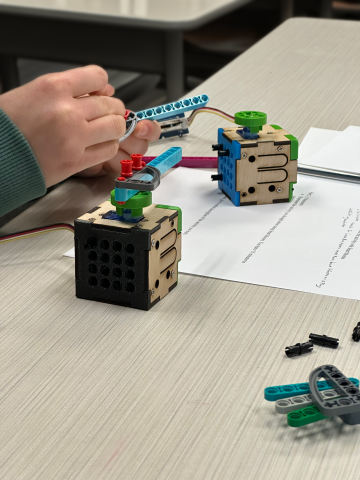Body
Image

Smart Motors - a low-cost platform for introducing supervised machine learning to children
Artificial intelligence and machine learning are quickly becoming critical tools for creativity and productivity. Through this RETTL project, we have developed a low-cost, AI-enabled hardware toolset called Smart Motors to introduce elementary school students to supervised machine learning concepts, which will prepare them to work confidently with AI in the future. This platform lowers students’ barrier to entry for creating interactive mechanisms and incorporating motors and sensors through a training-first, rather than coding-first, approach. We have developed our tool and program over the past three years in collaboration with afterschool and summer program partners in urban North St. Louis, as well as with various outreach programs in rural New Hampshire and beyond. We are investigating three primary research questions: 1) How does introducing tangible artificial intelligence elements change upper elementary students’ understanding of artificial intelligence concepts and attitudes towards artificial intelligence? 2) How do different levels of complexity and the variety of tangible artificial intelligence learning tools impact students' engagement and the diversity of their solutions and designs? and 3) What are the potential benefits and challenges of introducing tangible artificial intelligence elements in integrated engineering and literacy activities?
Pillar 1: Innovative Use of Technologies in Learning and Teaching
Innovative Use of Technologies in Learning and Teaching: Our project uses the newly developed Smart Motor hardware to introduce students to supervised machine learning concepts. These tools enhance literacy-integrated engineering design activities, where characters from grade-appropriate books are the clients. Simultaneously, students practice math skills such as collecting data and interpreting graphs.
Pillar 2: Partnerships for Career and Workforce Preparation.
Partnerships for Career and Workforce Preparation: Our pilot program was co-designed with educators from schools and outreach organizations in the North St. Louis community. Simultaneously, our team’s AI experts are identifying skills and knowledge that will be crucial to the future of work in that field.
Pillar 3: Strategies for Equity in STEM Education
Strategies for Equity in STEM Education: Our project is co-designing our program with outreach partners and educators in North St. Louis to develop and pilot activities that are meaningful and engaging to the Black and African American students in those communities.

Discipline(s)
Engineering
Emerging Tech (Artificial Intelligence, Quantum Computing, and Blockchain)
Interdisciplinary
Target Gradespan(s)
Elementary school (K-5)
Target Participant(s)
Youth / students
Black/African American participants
Students eligible for free lunch or reduced-price lunch
Project Setting(s)
Formal Education
Informal Education
Category
Exploratory